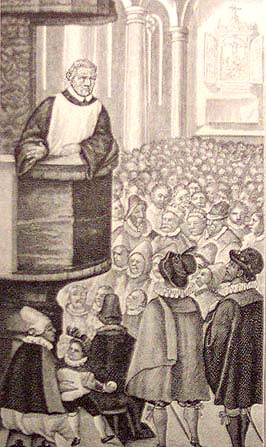Protestantism: Martin Luther
In this example of Lutheran art Martin Luther holds the interest of a large congregation as he expounds his teachings.
As Professor of Theology at the University of Wittenberg*, Luther formulated the doctrine which became the basis of the Protestant Reformation. He despaired that humans were incurably evil by nature and that no amount of "good works" could possibly merit a person's salvation. But in studying the Greek text of the Pauline Epistles he found new inspiration, which led him to teach a doctrine based on three revolutionary principles:
- By faith alone
- By scripture alone
- By grace alone
All these doctrines are discussed on the next page.
Several works by Luther are available on line.
Footnotes
-
U of W
The University of Wittenberg in Saxony was one of the new centres of humanist learning, and thanks to Luther became the hub of the Protestant Reformation; as well as clergy it attracted laymen desiring to receive the well-rounded education of the ideal Renaissance man. Hamlet, Horatio, Guildenstern and Rosencrantz all studied there, while Laertes preferred the University of Paris.
(Though in fact the University of Wittenberg was not founded until 1502, well after the early, near mythical, time in which Hamlet is set.)
